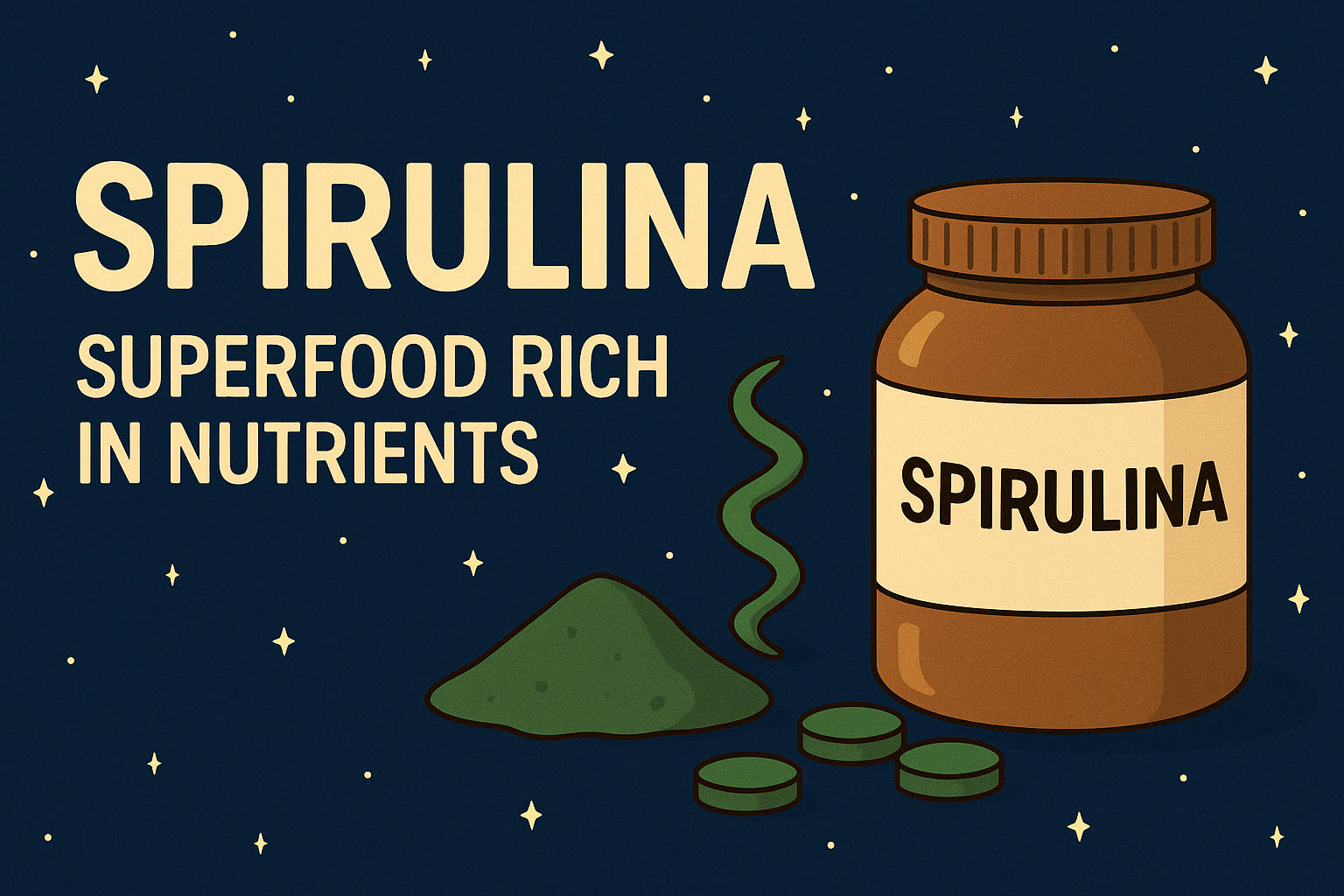If you’re looking for a powerful, natural way to boost your energy, support your immune system, and nourish your body — spirulina might be exactly what you need.
This vibrant blue-green algae is often called one of the most nutrient-dense foods on the planet. It’s been used for centuries and is now a go-to supplement for athletes, vegans, and anyone interested in better health.
In this guide, we’ll cover the benefits of spirulina, the different ways to take it, and how to safely add it to your routine.
💪 What Is Spirulina?
Spirulina is a type of blue-green algae that naturally grows in warm lakes and oceans. It’s been used by ancient cultures (including the Aztecs) and is now farmed around the world for its exceptional nutritional profile.
You can find spirulina in the form of:
- ✅ Powder – Ideal for smoothies and juices
- ✅ Tablets or capsules – Easy to swallow
- ✅ Spirulina drinks or bars – Found in health food shops
- ✅ Blended supplements – Combined with chlorella or other greens
🌱 Nutritional Benefits of Spirulina
Per 7g (about 1 tablespoon of powder), spirulina contains:
| Nutrient | Amount |
|---|---|
| Protein | ~4g (complete protein) |
| Iron | 11% of your daily need |
| B Vitamins (B1, B2, B3) | High levels |
| Copper | 21% DV |
| Magnesium, potassium, manganese | Trace amounts |
| Fibre | ~0.3g (plus gut-supporting effects) |
It’s also rich in:
- Phycocyanin – an antioxidant that gives it its blue-green colour
- Chlorophyll – supports detoxification
- Beta-carotene – supports skin and eye health
🌿 What Is Spirulina Good For?
✅ 1. Natural Energy Booster
Its combination of iron, B vitamins, and protein supports red blood cell production and oxygen delivery — helping reduce tiredness and fatigue.
✅ 2. High-Quality Plant Protein
Spirulina is 60–70% protein by weight and contains all nine essential amino acids, making it ideal for vegetarians and vegans.
✅ 3. Supports Immune Function
Phycocyanin has been shown to enhance immune activity and reduce inflammation.
✅ 4. Gut and Digestive Health
Spirulina contains a small amount of fibre, but it also helps promote a healthy gut environment. Some studies suggest it may support gut microbiota balance.
✅ 5. Helps Lower Cholesterol and Blood Pressure
Clinical trials suggest spirulina may:
- Lower LDL (“bad”) cholesterol
- Raise HDL (“good”) cholesterol
- Reduce blood pressure slightly with regular use
✅ 6. Detoxification and Antioxidant Protection
Spirulina binds to heavy metals and helps detox the body, while protecting cells from oxidative stress.
🥄 How to Take Spirulina (Powder vs. Tablets)
🟢 Powder Form:
- ✅ Easily added to smoothies, juices, yoghurts, or water
- ✅ Has a strong, earthy taste (best masked in green juices)
- ⚠️ Start with 1g and increase slowly to avoid nausea
🟢 Tablets/Capsules:
- ✅ Convenient and tasteless
- ✅ Perfect for daily use on the go
- ✅ Available in 500mg to 1000mg doses
🟢 Other Forms:
- Spirulina protein bars, energy balls, and green superfood blends are great for variety.
⚠️ Is Spirulina Safe for Everyone?
Most people tolerate spirulina well, but it’s not suitable if you:
- Have phenylketonuria (PKU)
- Have an autoimmune condition
- Are allergic to algae or seaweed
- Are unsure of supplement quality (choose organic or lab-tested brands)
Always check with your GP if you’re pregnant, breastfeeding, or taking medication.
📦 How Much Spirulina Should You Take?
- Start with 1–2g per day (½ teaspoon of powder or 2 tablets)
- You can increase to 5g per day gradually
- Drink plenty of water with it, especially in tablet form
According to Healthline, spirulina may also help reduce inflammation and improve endurance.
🔗 Final Thoughts: Should You Take Spirulina?
Spirulina is a natural, nutrient-rich powerhouse that offers:
- ✅ Complete plant protein
- ✅ Immune and antioxidant support
- ✅ A boost of iron and B vitamins
- ✅ Gut-friendly effects
- ✅ Detox and inflammation support
Whether you’re feeling tired, lacking greens in your diet, or simply want a natural way to supplement your health — spirulina could be worth adding to your daily routine.
🧠 Want better gut health too? Read: Prebiotics and Probiotics UK
👉 Like this article? Share it on Facebook 💬

Leave a Reply